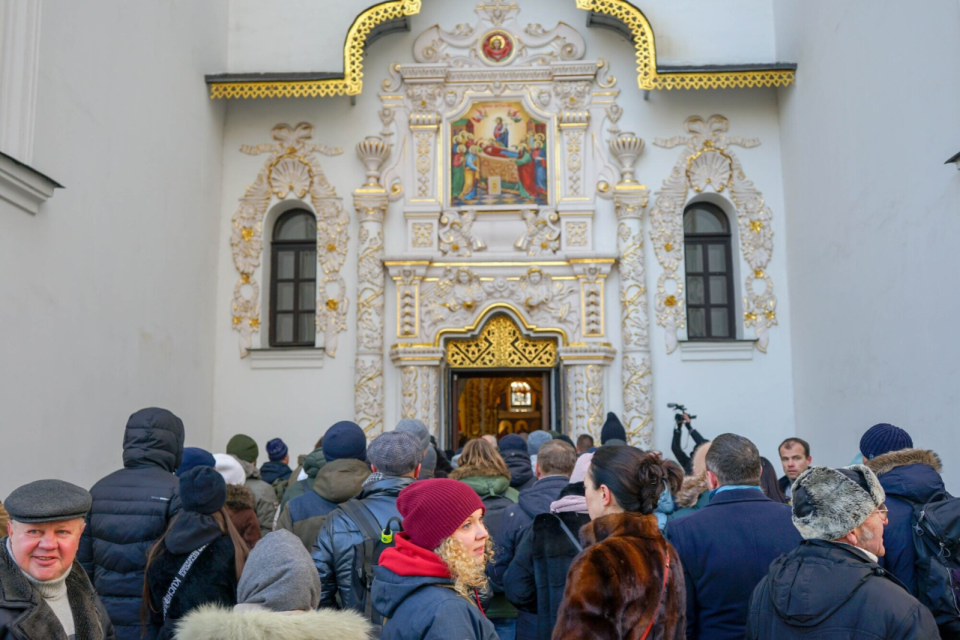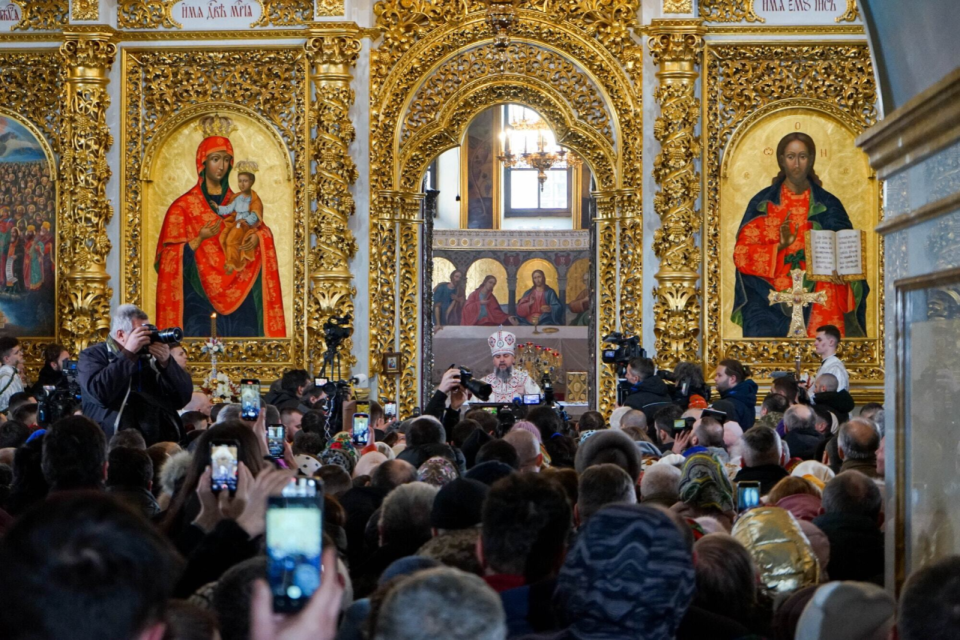Orthodox Church of Ukraine Holds First Christmas in Historic Kyiv Pechersk Lavra
- Oops!Something went wrong.Please try again later.
Read also: Epiphany will hold Christmas services in the Lavra. What will the UOC do?
The Orthodox Church of Ukraine (OCU) celebrated Orthodox Christmas services in the Holy Dormition Cathedral at the Kyiv Pechersk Lavra for the first time in its history on Jan. 7. It took over what was traditionally an event hosted by the Russian Orthodox Church (ROC) of Ukraine (formerly the Ukrainian Orthodox Church–Moscow Patriarchate).
NV visited the Lavra on that day to observe this historic event.
From Russia to Kyiv
The Kyiv Pechersk Lavra is one of the most iconic sites in Ukraine, and one of the holy sites of Eastern Orthodoxy as a whole. From its humble origins as a simple cave monastery, over the course of a thousand years, it was built, rebuilt, and renovated from fires and war. It is the center of the Eastern Orthodox faith in the country and its golden domes, baroque walls, and turquoise-colored roofs dominate the city’s skyline when viewed from the Dnipro river. But, for the last 337 years, it was never truly in the hands of the local Ukrainian faithful. With the exception of an interlude during the officially atheistic Soviet era when it served purely as a museum, during all of that time, it was controlled by the ROC.
That changed this Orthodox Christmas, which fell on January 7th due to the differences between the Gregorian and Julian calendars, when the OCU held services for the first time in the Holy Dormition Cathedral, the primary church on the Lavra grounds.
A Ukrainian prayer
Metropolitan Epiphany of Kyiv and All Ukraine stood before a gathered crowd packed into the cathedral for the holiday. His sermon prayed for the protection of Ukraine – in the Ukrainian language rather than the Lavra’s previously dominant Russian one – and called upon the Lavra’s clergy still loyal to Russian Orthodoxy to join the Ukrainian Church. He also thanked all of those gathered for making the return of the Lavra to Ukrainian hands a reality.
"We thank everyone who dreamed of Ukrainian prayer in this holy place, about its release from the captivity of the Russian world,” he said.
“Your prayers and your civic stance supported our state in a difficult, but completely correct decision."
A line ran out the front door for worshippers hoping to take part directly, instead of relying on the screen outside broadcasting the liturgy. The age of the congregants was also much lower on average compared to a typical church service, which commonly features women of middle and senior age.

In addition to the spectacle of the holiday was the genuine emotion of the congregation. The atmosphere was overtly celebratory, welcoming not only Christmas but also the feeling that this holy ground was finally, truly, Ukrainian again. One elderly woman, struggling to walk, wept with joy over being able to be there on that landmark day, calling out “Glory to Ukraine” to the response of “Glory to the Heroes.”
However, worshipers were not the only noticeable population – due to possible threats posed by the remaining ROC monks or other provocateurs, law enforcement was present and pervasive. Additionally, Russian attacks couldn’t be ruled out: a Christmas celebration would have been a very tempting soft target for any possible Russian saboteurs who might still be around in Kyiv. Entering the Pechersk Lavra meant passing through multiple checkpoints, a metal detector, and patrols.

Simmering conflict
The Orthodox Church of Ukraine is a recent creation, pieced together in 2019 out of other local Orthodox Christian churches under the authority of the Ecumenical Patriarch of Constantinople, the “first among equals” in the Eastern Orthodox faith. They are a separate organization from the Russian Orthodox Church, which has controlled the religion in the Ukrainian lands through-out the centuries of Russian occupation. Regular community parishes were free to choose which branch of Orthodoxy they wish to belong to, be it Ukrainian or Russian, without compulsion. However, the Russian Orthodox held fast to the more important, and wealthier, monasteries thorough the country – the Kyiv Pechersk Lavra, the Sviatohirsk Lavra in the Donetsk region, Pachaiyiv Lavra in Ternopil, and other holy sites.
This status quo was shattered following the full-scale invasion of Ukraine by Russia in February of 2022. The ROC made several attempts to publicly distance itself from its leadership in Moscow, which not only agitated for the war but propagandized it as a holy war for the faith. Famously, Vladimir Gundyayev, the Patriarch of Moscow, blessed Russian soldiers invading Ukraine and the invasion as a whole.
However, rampant collaboration between the ROC, which is rumored to be closely tied to the Russian security services (Gundyayev had been a KGB informant during the Soviet era), and Russian forces has drawn the ire of Ukrainian society, and parishes and parishioners are leaving the ROC in droves. Towards the end of the year, Ukraine’s security services began raiding ROC church premises, reportedly discovering prolific amounts of Russian propaganda materials, evidence of collaboration, and even hostile Russian citizens. In December, the National Security and Defense Council, and later President Volodymyr Zelenskyy, made calls for the government to restrict the activities of religious organizations that are tied to the Russian government, which more or less only means the ROC. However, they have not fully decided on the exact legal form this will take, and the Church is still in operation.
Church and State
The most concrete step the government has taken to restrict the ROC is in the Lavra itself, specifically the Dormition Cathedral, along with the nearby Tabernacle Church. While the ROC operated out of these churches, their hold on them was only a lease. Legally, the churches are the property of the state, administered by the Kyiv Pechersk Lavra National Preserve and over-seen by the Ministry of Culture and Information Policy. That lease expired at the end of 2022, and the government simply did not renew it. This is what allowed the OCU to conduct their services in the traditionally ROC church.

The ROC’s vicar for the Pechersk Lavra, Pavlo, declared in his own Christmas sermon that "The Primate of the OCU, Metropolitan Epiphany, is a devil and a self-sanctified.”
“The government of Ukraine went against its own citizens and Christ, and the loss of the temples of the Upper Lavra by the Moscow Church happened because of the weakness of faith,” he declaimed.
While the Dormition Cathedral and Tabernacle Church are no longer controlled by the ROC, they still hold onto most of the other churches on site, and was able to deliver regular services in them. This also includes the caves where the monastery began, where a millennium of Orthodox saints and other holy men are buried and receive pilgrimage. There are no plans yet to transfer the entire Lavra site to OCU control – though the OCU leadership, as well as the growing mass of faithful leaving the Russian church, are demanding the government do so.
Meanwhile, the ROC has indicated that they will be filing legal challenges against the non-renewal of the lease, and likely other acts the Zelenskyy administration has taken against Moscow’s church – including their legal renaming from the Ukrainian Orthodox Church–Moscow Patriarchate, to the Russian Orthodox Church of Ukraine.
The Ministry of Culture and Information Policy has focused on the fact that the territory does not belong to any religion, but the Ukrainian state and nobody will be receiving the kind of lease the ROC once had. In a press conference addressing the issue, Culture Minister Oleksandr Tkachenko said that “We cannot now transfer any buildings for free, as it was before, for long-term lease or for many years.”
“The legislation has changed,” he noted.
“Either the legislation will have to be changed again, or some other decisions will have to be made as a result of the work of the interdepartmental commission regarding the use of the property, which may to be transferred to one degree or another for religious organizations.”
Read the original article on The New Voice of Ukraine

